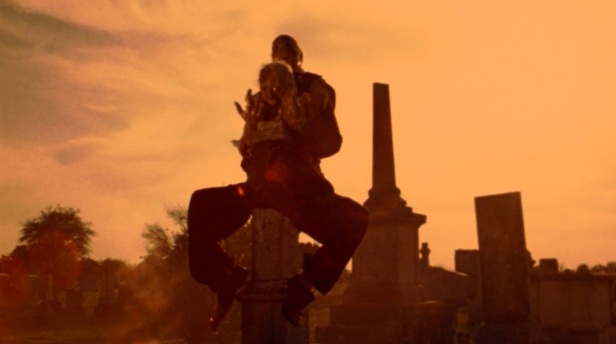
It’s hard for me to think of it this way, but Texas Chain Saw Massacre is now almost fifty years old. It’s an iconic and hugely influential horror movie, and even after all these years it remains an extremely effective and frightening film. As a teenager in the UK in the 1990s with an interest in the horror genre, I was intrigued by the aura of fear and danger around the movie, which was not classified for distribution in the UK until 1998. I saw it for the first time a year later, in 1999, when it was screened for the first time on British television by Channel 4. I remember finding certain sequences of the film to be utterly terrifying and profoundly disturbing; but I was also intrigued by some of the film’s subtext. Two decades later, the raw power of its horror hasn’t faded, and even if its thematic content feels a bit hackneyed, it hasn’t lost its relevance.
Texas Chain Saw Massacre is presented as a true story, but it isn’t actually based on real events (although like many other horror movies, it was informed by the real-life crimes of Ed Gein). Part of the film’s influence can be seen in that its early sequences – a group of twenty-somethings on a roadtrip in Texas come across a cabin in the woods – have been reproduced endlessly by later movies. While most horror movies tend to be shot at night, the Texas Chain Saw Massacre is shot for the most part during the day, and in intense sun and heat too. There’s a lurid quality to the cinematography that’s quite unsettling, and it’s not just down to the references to graverobbing and dead animals on the highway. The (admittedly outlandish) events of the film are situated in close proximity to the meat industry and the industrial slaughter of livestock, and the callous and inhumane treatment of animals is an important part of establishing the film’s horrific atmosphere; because of course when we see people treated in such a way, it is appalling and really scary. It would be too much to say the film has a vegetarian message as such, but it does make you think about the meat industry, in a really unsettling way.
Texas Chain Saw Massacre inspired legions of films that tried to copy its formula for success, but few have been able to reproduce the sense of tension and dread which it establishes over its first half hour. The whole hitch hiker sequence in the beginning is disturbing as hell; shortly after that, the film also features arguably the most frightening sequence in cinematic history, which anyone with an interest in the genre really has to experience.
The film gets your emotions to boiling point early on, and sets a high-water-mark which the rest of the film finds hard to match; to my mind, the second half gets a bit bogged down in unnecessary quasi-supernatural material. Filmmaker Tobe Hooper has explained the film was partly a reaction to events like Watergate and the Vietnam War, and it certainly exhibits a cynicism about American culture which was very much of its time in the early 1970s. In general, there’s probably too much pseudo-intellectual deconstruction of films like this (pot, meet kettle), and I think it’s misguided to regard Texas Chain Saw Massacre as a post-modernist film per se. But, with its cynical perspective, it’s easy to retrospectively cast the film in such a category.
On a purely functional level, it’s hard to criticize Texas Chain Saw Massacre. Its power to disturb and terrify is undiminished, which testifies to its basic integrity and twisted artistry. It’s remarkable that after so much time, it is still unsurpassed in the stakes of pure horror; which is also a statement on the development (or otherwise) of the genre. That said, certain things that helped makeTexas Chain Saw Massacre feel authentic would not fly well today (the health and safety conditions the actors and crew worked in are almost as frightening as the film itself). Also, while the first half of the film is perfectly paced, the second half does feel like it spins its wheels too long. It’s already a short film, but it probably could have afforded to lose ten minutes. You feel for the poor actress who spends so long screaming – it must have played havoc with her vocal chords. But as T. pointed out to me, at least here the screaming is in the service of a plot point, rather than the plot point itself: in other words, at least this film shows you there is good reason to scream, and you know what’s going on.
Considering that Texas Chain Saw Massacre provides the perfect template for a horror film, you’d think others would follow it better. While it might not have much of a soul of its own, it certainly does a good job of making you fear for your own.
9/10

(pot, meet kettle) I like it!
LikeLike